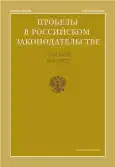Digital state plan ("Gosplan"): key parameters, approaches to legal regulation, the need for modeling, challenges and prospects
- Authors: Belikova K.M.1
-
Affiliations:
- Kutafin Moscow State Law University
- Issue: Vol 18, No 4 (2025)
- Pages: 105-112
- Section: Private Law (Civil) Sciences
- URL: https://journal-vniispk.ru/2072-3164/article/view/313158
- DOI: https://doi.org/10.33693/2072-3164-2025-18-4-105-112
- EDN: https://elibrary.ru/AJDAMY
- ID: 313158
Cite item
Abstract
From the perspective of analyzing the idea of preparing a unified digital planning model, the digital State plan proposed by experts from the scientific and educational community and discussed by practitioners is examined in the article. The article touches upon the main parameters, approaches to legal regulation, the need for prototyping, and challenges and prospects for the development and implementation of this idea. The work uses dialectical and other general and specific scientific methods, such as comparative legal analysis, historical analysis, synthesis, and others. The author notes that the idea for creating an automated system for collecting and processing data for accounting, planning, and managing the national economy (OGAS) was discussed in the USSR but was not implemented at that time. The text outlines the contours of Russia's strategy to gain technological independence by reducing dependence on foreign technologies and ensuring information security and control including the introduction of a digital ruble and legal regulation of platform economies, the commissioning of domestic messengers such as Max, etc. to implement the idea discussed. Examples of foreign models (of the EU, USA, China) for achieving an effect similar to that stated are given. The author reveals the theoretical basis for the idea of digital State plan and emphasizes that the experience of the USSR in creating and launching products, working with ministries, scientific and production associations, and defining industry and technical specializations is useful. The author emphasizes the aspects of the possible use of digital State plan in planning at the present stage saying that the State plan will no longer dictate strict requirements but rather act as a coordinator and assistant providing support through government orders, tax incentives, investment support, quality regulation, and standards. The prospect of using algorithms and artificial intelligence systems based on the digital State plan, through integration, for example, by way of synergy between inter-departmental interaction and other interactions (between enterprises and government agencies, etc.), is shown. A number of recommendations are provided for implementing the digital State plan.
Full Text
##article.viewOnOriginalSite##About the authors
Ksenia M. Belikova
Kutafin Moscow State Law University
Author for correspondence.
Email: KMBelikova@msal.ru
ORCID iD: 0000-0001-8068-1616
SPIN-code: 2541-3498
Dr. Sci. (Law), Prof., Professor of the Department of Entrepreneurial and Corporate Law
Russian Federation, MoscowReferences
- Forrester J. Fundamentals of enterprise cybernetics. Industrial dynamics. Translated from English Moscow: Progress, 1971.
- Kuteynikov A.V. The fate of the original idea of A.I. Kitov, the project to create an automated management system of the Soviet economy (OGAS). Scientific papers of the Free Economic Society of Russia. 2010. Pp. 132–138. (in Rus.).
- Safronov A.V. The automated system of scheduled calculations of the USSR State Planning Committee as a necessary step towards a nationwide automated system of accounting and information processing (OGAS). Economic history. 2019. Vol. 15. No. 4. Pp. 395–409. doi: 10.15507/2409-630X.047.015.201904.395-409. (in Rus.).
- Morkhat P.M. Comparative legal study of the positioning of artificial intelligence in the judicial process. Legal researches. 2024. No. 7. Pp. 13–28. (in Rus.).
- Lowry, A. (2021). Russia’s Digital Economy Program: An Effective Strategy for Digital Transfor-mation? In: Gritsenko, D., Wijermars, M., Kopotev, M. (Eds.). The Palgrave Handbook of Digital Russia Studies. Palgrave Macmillan, Cham. https://doi.org/10.1007/978-3-030-42855-6_4.
- Barari Reykandeh, Kh. & Shokri, Sh. A. (2022). Russian Digital Economy and Cybersecurity: An Over-view of Recent Developments. Journal of World Sociopolitical Studies, 6(3), Pp. 439–498. https://doi.org/10.22059/wsps.2023.351976.1326.
- China’s digital transformation. The experience of transforming the infrastructure of the national economy . Translated from Chinese. Moscow: Alpina, 2019.
- Raizberg B.A. Gosplan and state strategic planning. ENSR. 2008. No. 1(40) Pp. 116–124. (in Rus.).
- Frolova E.K. Actual problems of legal regulation of the aviation industry development in the context of global market transformation. Bulletin of the O.E. Kutafin University. 2023. No. 8. Pp. 40–50. doi: 10.17803/2311-5998.2023.108.8.040-050. (in Rus.).
- Penkov B.E. Techpromfinplan of the enterprise. The Great Soviet Encyclopedia: [in 51 volumes]. chief editor S.I. Vavilov. 2nd ed. Moscow: Soviet Encyclopedia, 1949–1958. URL: https://gufo.me/dict/bse/Техпромфинплан_предприятия?ysclid=mdncunpcco109189090 (accessed: 07/28/2025)
- Law and the real sector of the Russian economy: a monograph. I.V. Ershova, V.A. Laptev (Eds.). Moscow: Prospekt, 2024. 480 p.
- Experimental rulemaking: doctrine, practice, methodology: monograph. O.A. Tarasenko (Ed.). Moscow: Prospekt, 2024. 136 p.
- Belikova K.M. Restoration and development of new territories of Russia and digital technologies. Law and Business. 2023. No. 3. Pp. 39–41. (in Rus.).
- Levushkin A.N., Morozov S.Yu. Digital trade turnover and remote method of selling goods in the paradigm of theory and law enforcement practice. Bulletin of arbitration practice. 2024. No. 5 (114). Pp. 3-10. (in Rus.).
- Levushkin A.N. Ensuring a balance of interests of participants in digital trade turnover. Bulletin of the O.E. Kutafin University (MSAL). 2024. No. 8 (120). Pp. 158-165. (in Rus.).
Supplementary files









